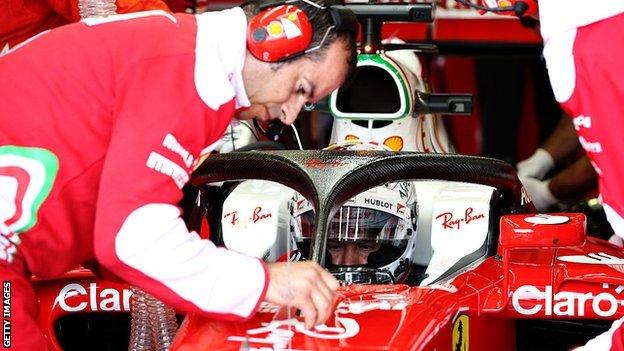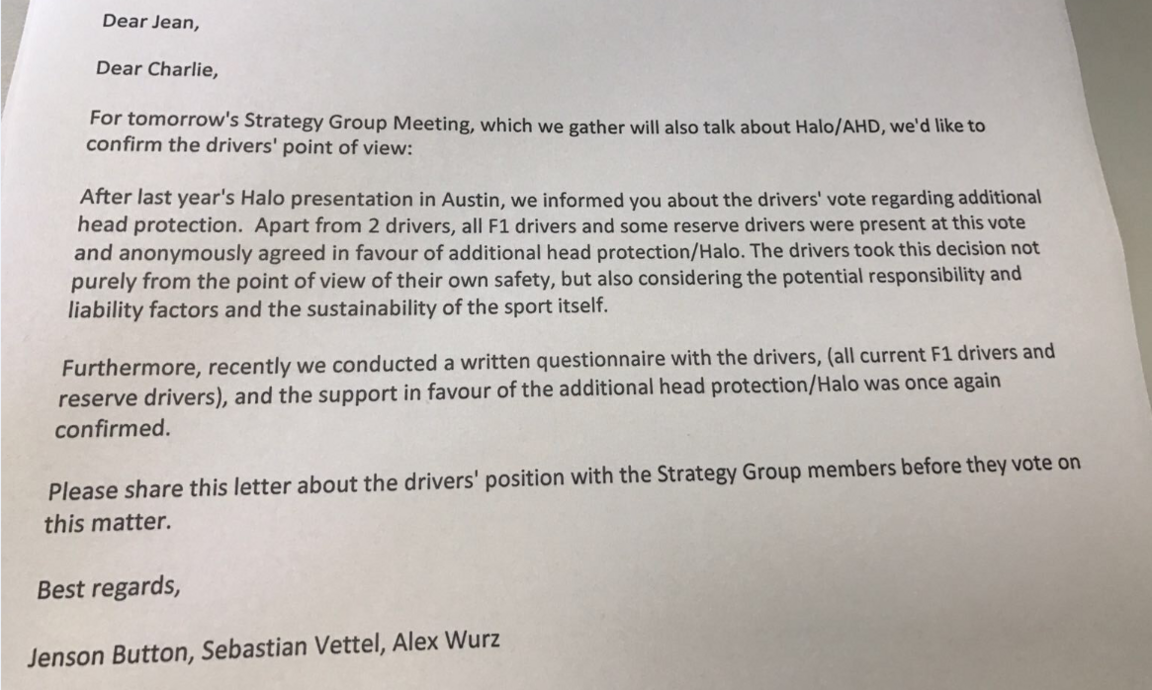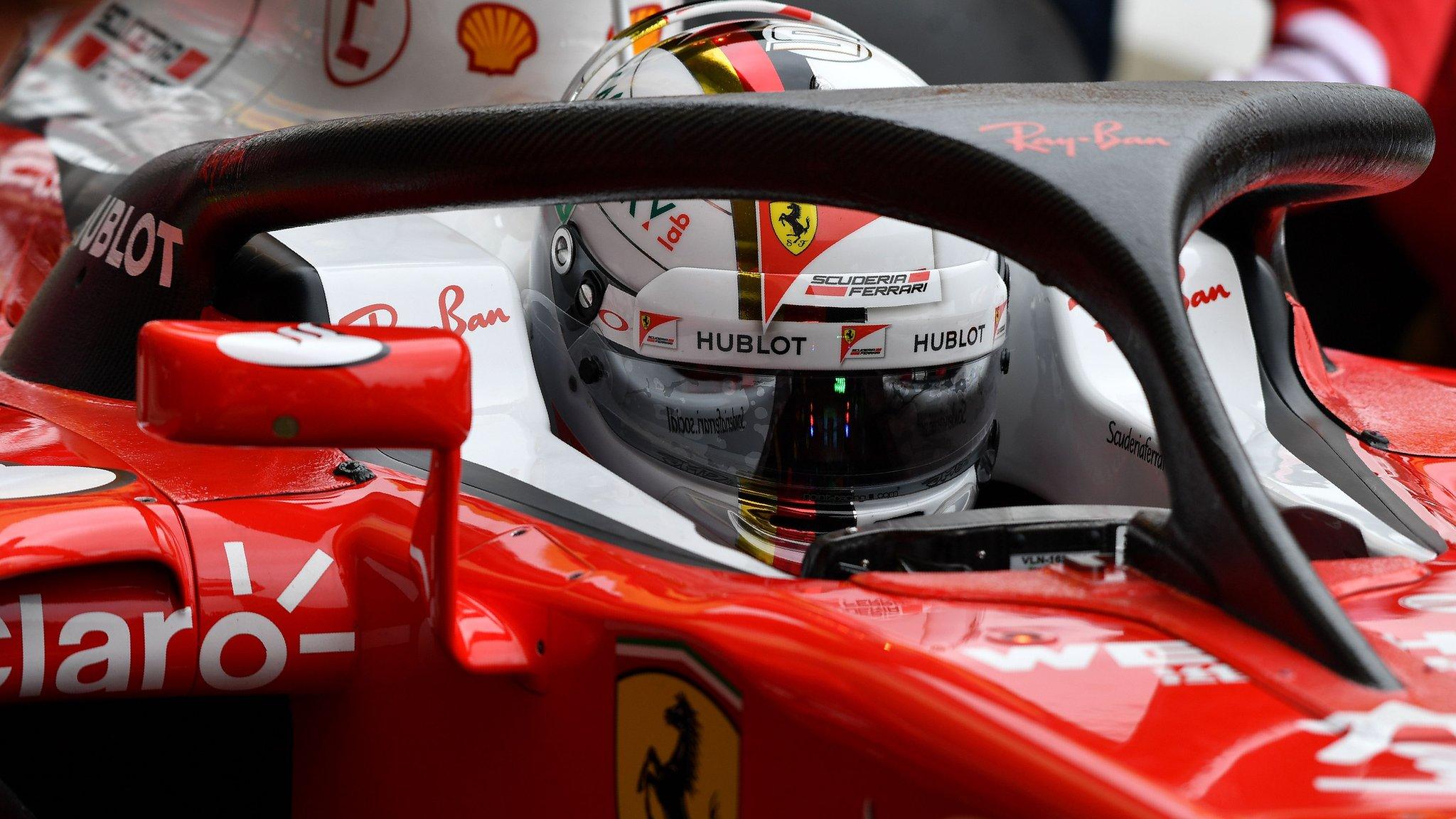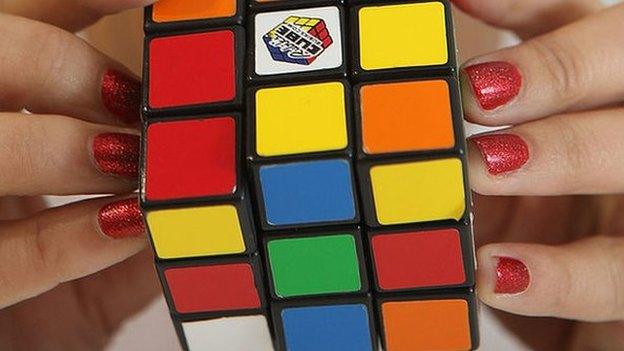Formula 1: Sebastian Vettel and Fernando Alonso back introduction of 'halo'
- Published
- comments

The 'halo' was found to be the only device that both successfully passed the test of deflecting a wheel fired at it at 150mph and provided a largely unobstructed view
Hungarian Grand Prix on the BBC |
|---|
Circuit: Hungaroring Date: 28-30 July |
Coverage: Practice sessions on BBC Radio 5 live sports extra (online only), qualifying and race on BBC Radio 5 live. Live text commentary, leaderboard and imagery on BBC Sport website and app. |
Leading Formula 1 drivers have backed the decision to introduce the controversial 'halo' head protection system next season.
Four-time champion Sebastian Vettel said the sport would be "ignorant and stupid" not to use the device.
Fernando Alonso said it would have helped in "many of the fatal accidents" in motor racing in the past 15 years.
Lewis Hamilton said it "doesn't look good" but he "definitely doesn't argue against it".
The three-time champion added: "We are moving towards a closed cockpit. That would look better. There are some great concepts online with closed cockpits.
"When you think about the things that have happened with drivers being hit on the head, it is kind of crazy the head is almost the most precious part of the body and it is exposed."
Governing body the FIA said the halo was the "best solution" to improve cockpit safety.
The halo is designed to protect drivers' heads from impact with large flying objects - or with external bodies such as walls if the car is airborne.
Vettel added: "Overall, you need to understand it is a decision that helps us in the car in case something goes very wrong.
"I can understand if people say it doesn't belong on an F1 car, but times are changing."
Vettel pointed out the halo would have saved the life of IndyCar driver Justin Wilson, who was killed by flying debris in a crash at Pocono in 2015.
"If you offer the system and the protection it gives us to Justin Wilson, he would take it and we would take it to save his life," Vettel said.
How have F1 cockpits evolved?
Two-time champion Alonso said he would have felt safer during his 180mph roll-over accident at the 2016 Australian Grand Prix had the halo been fitted.
The Spaniard added: "If we could go back in time and save some of our colleagues' lives, we would be all happy. That is the first and only thing we should talk about.
"The aesthetics, I don't care too much. F1 has changed so much even from my first year in 2001. The cars are so different - the height of the front nose, the height of the cockpit area. Forty to 50 years ago they did not have seat belts.
"For me there is no question - I'm happy to implement any extra head protections. If the FIA studies and develops the halo, if this is the most effective way to protect the head of the drivers, it is more than welcome."
A minority of drivers have expressed reservations about the device because of the impact of the looks and questions about whether it is really necessary.
Among them, Renault's Nico Hulkenberg said: "There is that element of aesthetics, the looks.
"It will protect against a freak accident - one out of a million that happens. The (wheel) tethers that keep the tyres (attached to the car) get better every year, giving even less chance of a tyre flying around.
"I'm not sure this additional protection is necessary because the other areas keep improving and it compromises the looks a lot."
Red Bull's Max Verstappen said: "I don't really understand why we need it."
Hulkenberg's Renault team-mate Jolyon Palmer and the Haas drivers Kevin Magnussen and Romain Grosjean have also voiced their opposition.

A letter written in 2016 by members of the Grand Prix Drivers' Association backed the introduction of the 'halo' head protection device
Vettel said the "vast majority" of the drivers supported additional head protection.
The German is a director of the Grand Prix Drivers' Association, which has long backed the idea of additional head protection.
A year ago the GPDA wrote a letter to the strategy group of leading teams, the FIA and commercial rights holder backing the move.
The letter, seen by BBC Sport, said all drivers and reserve drivers bar two were present at a vote taken by the GPDA and they "anonymously agreed in favour of additional head protection/halo".
The letter added: "The drivers took this decision not purely from the point of view of their own safety, but also considering the potential responsibility and liability factors and the sustainability of the sport itself.
"Furthermore, recently we conducted a written questionnaire with the drivers, and the support in favour of the additional head protection/halo was once again confirmed."
- Published21 July 2017
- Published19 July 2017

- Published28 July 2017

- Published26 July 2017